Article of the Month -
September 2004
|
Land Administration in Europe
Helge ONSRUD, Senior Advisor, Statens kartverk Norway
This article is based on a keynote presentation
that the author gave at the FIG Working Week in Athens in May 2004. It
presents viewpoints in a popular form. It should not be read as a scientific
study.
 This article in .pdf-format.
This article in .pdf-format.
Key words:
1. CHANGING THE CORE SKILLS OF THE PROFESSION
The surveying profession is rapidly changing. From playing a key role in
understanding, exploring and opening the lands and seas of the World; now
almost everybody can make real time precise positioning and machines can
make accurate maps. The science of geodesy and mapping will not disappear,
but far less academics founding their core activities on those skills will
be needed. At the same time management of land and waters is coming very
much on the agenda as crucial to environmental sustainability as well as to
social and economic development. Changing from geodetic engineers to
administrators and managers of land and property, the profession has a
golden opportunity to maintain its role in society. Particularly this has
over the last decade been highlighted by the Peruvian economist and writer
Hernando de Soto.
2. HERNANDO DE SOTO
 In
the Time Magazine of April 26 2004 the Peruvian economist Hernando de Soto
was nominated one of the 100 most influential people of the World. In
the Time Magazine of April 26 2004 the Peruvian economist Hernando de Soto
was nominated one of the 100 most influential people of the World.
”I predict that in the next 150 years the countries in Latin America
and elsewhere joining these 25 (countries with a developed economy) will
be those that spend their energies ensuring that property rights are
widespread and protected by law, rather than those which continue to focus
on economic policy.
- Hernando de Soto
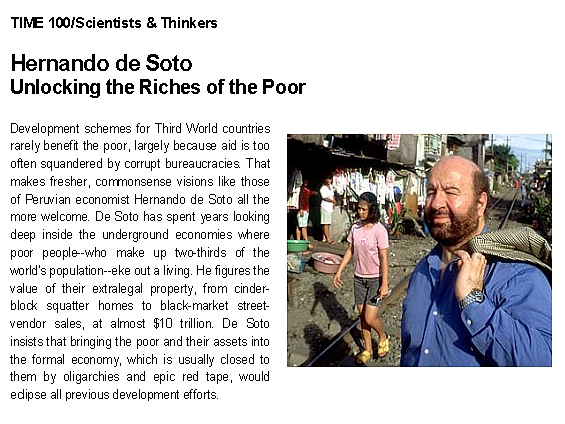
De Soto’s messages, not least through his book “Mystery of Capital –
why capitalism works in the west and nowhere else” has raised the
awareness throughout the World of the role of widespread, secured and
tradable property rights in combating poverty. De Soto underlines that
registered property is the fundamental resource for capital formation, and
not only by being used as collateral for mortgages. It has far wider
impacts, such as providing people with recognised addresses to which
suppliers of public services can relate their bills – thus facilitating
investments in water supply and other basic services. Formalising property
rights are not only about freehold titles. As long as the rights are
registered and thus made tradable a range of tenures can support capital
formation. However, registration of the property objects and the related
rights are not enough to achieve the overall objectives. In addition people
and businesses must be enabled to act in the property market. Particularly
for small and medium size businesses, company registers are essential to
enable them to use property as collateral and otherwise act in the property
market.
De Soto’s message has reached top politicians in developing countries as
well as in countries and in international institutions that are aiming at
assisting these countries in elevating poverty and related social problems.
A recent example from my own country shows this clearly; In an article in
the largest newspaper the Norwegian prime minister, Kjell Bondevik,
stated that formalisation of property rights will be a cornerstone in
Norwegian aid to developing countries an to countries with economies in
transition:
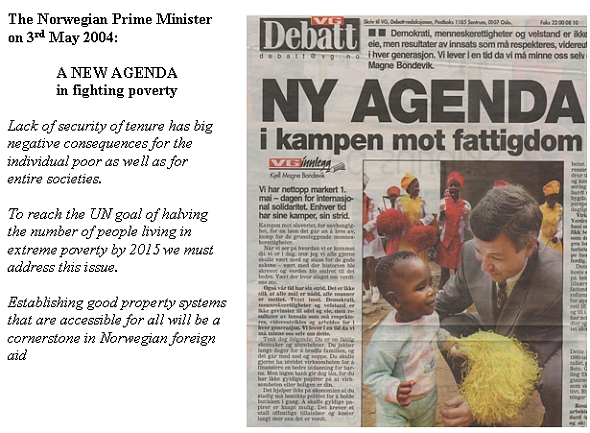
3. WHAT IS A GOOD PROPERTY SYSTEM ?
What are the characteristics of a good property system ? Probably it can
be summarised in the following points:
- Ownership and other forms of secured rights to real property are
widespread
- People in general can participate in the land market
- “All” can transact, “all” have real access to registration
Fair distribution of land is still a big issue in many countries. Almost
all countries have some sort of registration system, but in very many
countries the poor does not in reality have access to the registration
services and are forced to transact outside the formal system. Probably no
more than 25 – 30 countries in the World have property systems that fulfil
all the above criteria. To join the 25 to 30 countries the infrastructure
supporting formalisation of rights and transactions in land and property
must be transparent, simple, fast, relatively cheap, reliable and free from
corruption.
The World Bank has recently made a World-wide survey of the public
services that underpin a viable market economy; “Doing Business 2004”.
It does not show to what extent the poor have access to the services, but is
still shows some remarkable differences:
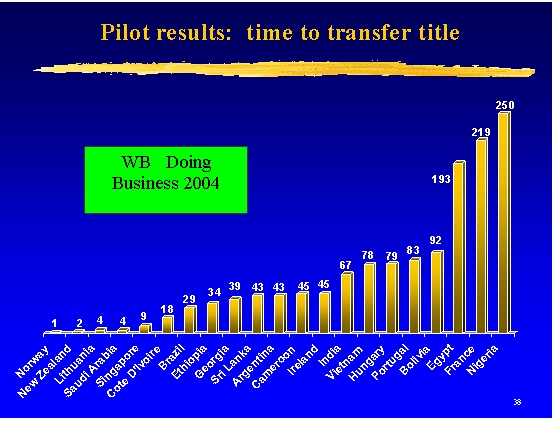
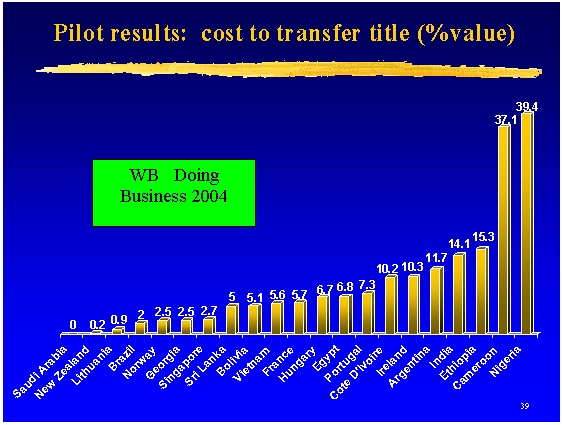
Most West-European countries have well functioning property
systems, but not all existing systems are optimal. Most countries have
completed electronic registers and digital cadastral maps. Further
modernisation is possible and desirable, but it seems difficult to break
with old traditions. There are some examples of introducing a single agency
responsible for the cadastre as well as the land register. In addition to UK
and the Netherlands who have had an integrated registration service for many
years, Italy has made a corresponding and impressing reform, and Norway and
Iceland has recently started to transfer the land register from the courts
to unify it with the cadastre authority. The other Nordic countries are
currently all considering reforms in the same direction. On the other side,
there are no examples of removing the monopolies of notaries in
West-European countries that have a notarial system.
Little is implemented so far in respect to electronic documents, but it
will certainly be introduced during the next 5 - 10 years. It will have a
big impact on the organisation of the cadastre as well as on the land
register. Countries that decide to maintain the land register with the
courts and to keep the notarial monopolies will face most problems in
reforming their registration services to keep pace with the technological
possibilities of e-commerce and e-government. Inclusion of 3D properties is
also an upcoming issue.
In a somewhat longer perspective the European single market will have a
significant impact on the laws and systems supporting the land market. An
open mortgage market may be the first to push towards harmonising the
registration services.
Former socialist countries in East and Southeast Europe have
undertaken or are still undertaking huge projects for restitution of private
ownership and in building registration services for the emerging land
market. Most of the transition countries return to old pre-socialist systems
- including re-establishing a monopoly for notaries to prepare documents for
registration. In these countries the notarial fees add considerably costs to
property transactions. A number of transition countries made more radical
changes establishing from the beginning a single agency for the cadastre and
the land register, and Romania has just decided to transfer the land
register from the courts to unify it with the National Cadastre Agency.
Experience show that the juridical sector has more problems in adapting to
modern user service standards and register technologies.
The land markets, particularly in apartments are evolving quite rapidly,
and so do the mortgage markets in many of these countries. However, in some
countries, or rather at some courts, it may still take several years to
register a deed.
Some few transition countries have completed the cadastral maps and
maintain them in digital form, but the majority of the transition countries
still have to undertake large works to complete first cadastre maps. The
cost and the time to complete the cadastral maps depend heavily on the
technical requirements for precision and completeness. A few countries have
adopted a concept of index maps, accepting that the first generation maps
will be upgraded over time as a result of individual transactions. Those
countries that stick to very high geodetic precision for the massive
registration of parcels will face big financial problems. Many countries
would benefit from identifying the urgent users needs and adopt standards
that support these needs and as well can be achieved with the most cost
effective surveying methods (like identifying corner points visually in
ortophotos without additional field surveying). The following table may
illustrate the need for precise cadastral maps, where “low” accuracy” could
be 0,5 millimetre in the appropriate display scale, which would mean from
0,5 meter in urban areas to 2 - 3 meters in agricultural areas:
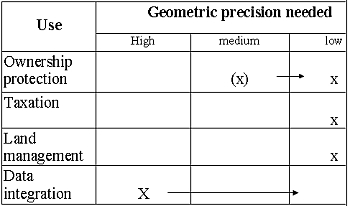
Many transition countries in Europe have still to sort out and distribute
ownership to land in urban areas. Another big issue is the management of
multi-apartment blocks where the apartments are privatised without ensuring
a proper system for maintaining the common parts of the buildings. That may
potentially result in big social problems in these countries. It seems to be
a trend that the countries prioritise rural areas rather than the cities,
where indeed the most active land markets are. The IACS and INSPIRE
initiatives of the European Union, very much linked to the agricultural and
environmental policies, could further lead to prioritising rural areas
before areas where an active land market could contribute most efficiently
to economic growth.
In developing countries customary tenure systems calls for special
solutions, including registration of different types of right to land, group
rights, gradually improving tenure rights, etc. However in the cities and in
the fast growing informal urban settlements, individualised ownership rights
or long leases are appropriate tenure systems. Formalising property rights
in developing countries calls for solutions that are tailored to the needs
of the poor dwellers and small businesses, also to keep their property
inside the formal system once registered. Fundamental reforms to the
property system are needed in many countries, including distributing land
from a rich elite or the state to the poor.
4. CHALLENGES TO THE SURVEYING PROFESSION
To respond to the challenges coming from the increasing awareness of the
importance of good property systems, the surveying profession should:
- Understand the wider importance of good property systems
- Recognise that we must engage in a wider range of land market related
issues
- Recognise that we are in a service business - moving the focus from
products to services
- Accept that the land market is continuously changing
Surveyors have traditionally engaged in the definition of the property
objects only – in the green box.

To make a better contribution to the overall objective – a well
functioning land market for all – surveyors have to engage in all the
services that support the land market, including registration of rights in
property (land register) and in ensuring that the subjects – persons and
companies - really can act in the land market. In addition we need to
respond to the continuously changing demands from the land market, such as
“producing” the types of property objects that the market would like to make
transactions in at any time. Our success will be measured by such data
showed in the below figure from the World Bank report on Doing Business
2004. The increase in registration of new companies is obviously related to
a number of factors outside the functioning of the land market, but it
illustrates the performance indicators surveyors need to respond to. The
illustration concerning registration of companies shows that notaries add
cost and time – the same could certainly be said in relation to land
transactions.
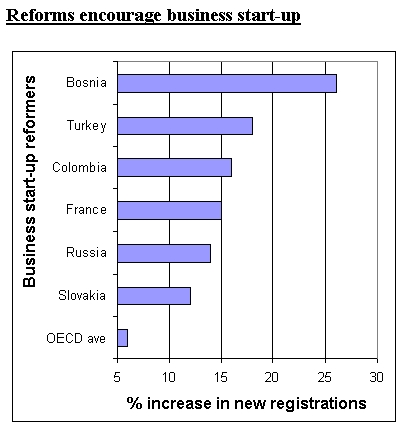
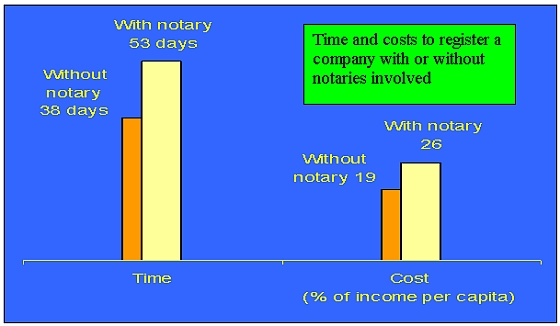
5. KEY ISSUES FOR LAND ADMINISTRATION REFORMS
It is no best system that fits all countries, but we should learn more
from best practises and do benchmarking. Some of the more clear issues that
can be observed from experiences and comparisons between countries are:
- Move focus from products to services
- Remove the land registry from courts
- Make a single and self financed land and property agency
- Remove the monopoly of notaries - it works fine without
- Involve private sector when private sector can do the job
- Change the education of land surveyors - much less time geodesy and
mapping , much more time to land law, land management
In addition it is relevant to consider:
- Should private investors be welcomed to take part in cadastre and land
registration, could private companies operate registers?
Preparing for the future we should:
- Take account of the growing number of public restrictions on land and
buildings and ensure that the parties in the land market have easy access
to the related information
- Look for one stop shopping of land and property registration and
information services
- Prepare for electronic conveyancing, real time mortgaging and direct
registration by authorised agents
- Prepare for additional types of property; 3 D etc
- Prepare for international land markets and harmonisation of property
systems across borders
For transition and developing countries:
- Accept that major reforms may be needed to service all
including the poor
- Service individual user driven transactions throughout the country
before doing systematic completion of maps and registers
- Prioritise urban issues
- Sort out ownership to land in urban areas
- Resolve land issues in informal settlements
- Resolve problems with multi-apartment blocks
- Take more risks in preparing cadastral maps, it works fine without 100
% completeness and very high precision. High precision in establishing
cadastral maps costs a lot of money and takes a lot of time
- Accept that boundaries mainly are features in the field
- Make a first acceptable map as quickly as possible - users are
queuing up for digital data
- Accept gradual improvements over time and where it is needed
- Let people buy property with uncertain boundaries if they so want,
let users pay for high precision
CONTACTS
Helge Onsrud
Statens Kartverk Oslo Akershus
P. O. Box 8120 Dep.
N-0032 Oslo
NORWAY
Tel. + 47 32 11 81 00
E-mail: helge.onsrud@statkart.no
 |























 In
the Time Magazine of April 26 2004 the Peruvian economist Hernando de Soto
was nominated one of the 100 most influential people of the World.
In
the Time Magazine of April 26 2004 the Peruvian economist Hernando de Soto
was nominated one of the 100 most influential people of the World. 







